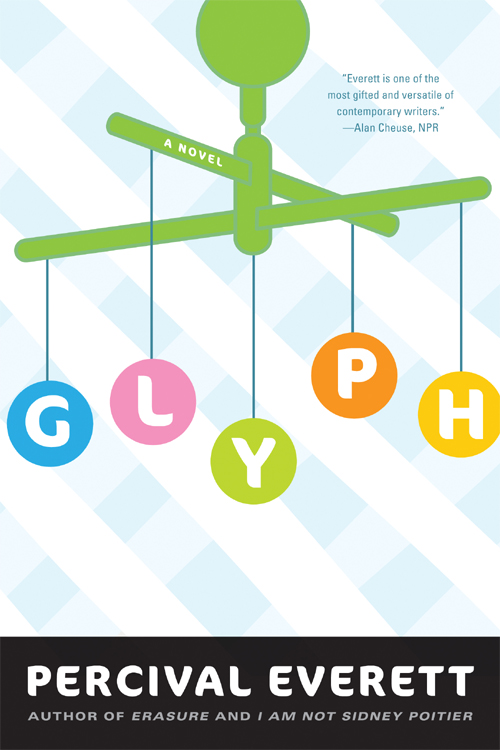
Glyph
A Novel
کتاب های مرتبط
- اطلاعات
- نقد و بررسی
- دیدگاه کاربران
نقد و بررسی

October 4, 1999
A creator of fantastically clever fictional conceits who at times is incapable of channeling his seething imagination into a coherent story line, Everett (Frenzy) attempts another ambitious feat of literary ventriloquism in this off-kilter academic spoof about an infant with an IQ of 475. Grandiosely reminiscing, at age four, on the tumultuous first few years of his life, Everett's hero, Ralph, recounts his manipulation and eventual imprisonment at the hands of a group of nefarious, constantly squabbling adults. "My father was a poststructuralist pretender and my mother hated his guts," declares Ralph, who at roughly 10 months confounds his parents by composing hyper-sophisticated poems about the human anatomy. Ralph refuses to speak, but begins devouring books in his crib, reading "all of Swift, all of Sterne, Invisible Man, Baldwin, Joyce, Balzac, Auden," and everything else within reach. He's reading Daisy Miller one evening when he is kidnapped and held hostage in a remote, pink stucco research institute, by a violently unstable child psychologist who hopes to dissect him, mentally and perhaps physically, and ride her discoveries to academic superstardom. He is then kidnapped from his kidnappers by a rogue Pentagon officer, who views Ralph as the ultimate espionage device, and kidnapped again by a Latino couple seeking their first child. These events are not recounted in linear fashion, but are, as befits an infant learning to mimic his surroundings, interspliced with a maddening hodgepodge of semiotic analysis, intricate equations and diagrams and often silly imagined dialogue between philosophers and writers. Emerging from this clutter of ideas is a notion that will strike a chord for those without the wherewithal to wade through this densely philosophical novel. Genius, Ralph proposes, must not be measured by one's command of all of Western civilization's great ideas, but by the ability to find "a way back to the beginning where the truths are uncorrupted and honest and maybe even pure."

November 1, 1999
"My father was a poststructuralist and my mother hated his guts." That's exactly the sort of snide aside one might expect from an exasperated child prodigy--but not from an enfant. Little Ralph, however, is barely a year old when he makes this observation, and though he refuses to speak, he writes quite observant comments on his sheets and is soon plowing through the classics of Western literature and philosophy, which his mother sneaks him. This gives rise to considerable discussion of the nature of language and being that will be fun for the academically inclined but doesn't quite fly. In any case, the heart of the novel is the conflict between Ralph's loving mother and those who are terrified of the little boy's genius--his arrogant but clueless dad, a mean psychiatrist, and a priest bent on exorcism. The ever-experimental Everett (Frenzy) makes good points about the way children who don't fit the mold are treated in this society. But finally this is a not-so-uncommon story of how an intuitive artist mom ("with a wild hand I envied") wrests control of her son from the forces of evil. Had Ralph been less mean-spirited himself, this could have been a funny and insightful book, but he's crabby and insufferable enough to leave a sour taste. For readers who like fancy intellectual footwork.--Barbara Hoffert, "Library Journal"
Copyright 1999 Library Journal, LLC Used with permission.

October 15, 1999
Ralph is an 18-month-old prodigy. But he's not just any run-of-the-mill genius: he reads philosophy and theology, modern fiction and poetry, physics and philology with equal gusto. Choosing silence over speech, Ralph communicates his thoughts via handwritten, wonderfully cogent notes. Unfortunately, in the modern world, precocious genius cannot go unmolested. First, Ralph is kidnapped by a demented psychologist who wants to dissect him. He is snatched from the shrink by an equally demented army colonel who plans to turn Ralph into America's greatest secret weapon. A kind-hearted guard rescues Ralph from the military but unwittingly finds sanctuary for him with a pedophilic priest, who in turn loses him to television's most inept news crew. Throughout, Ralph calmly observes humanity, reserving his greatest admiration for people who can drive automobiles. Ralph is an amazing creation, a narrator who can imagine conversations between Wittgenstein and Nietzsche but who hasn't quite mastered toilet training. Literary fiction that can be enjoyed by almost anyone. ((Reviewed October 15, 1999))(Reprinted with permission of Booklist, copyright 1999, American Library Association.)

























دیدگاه کاربران